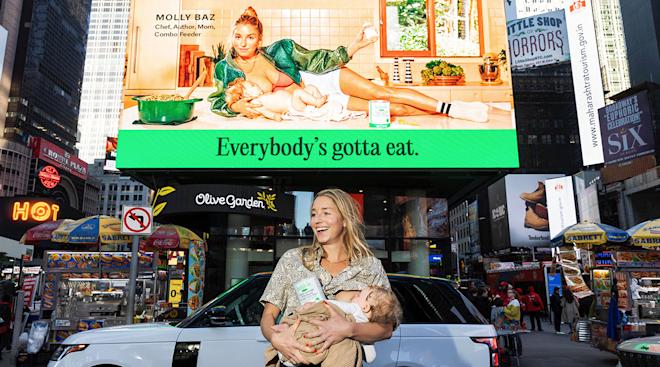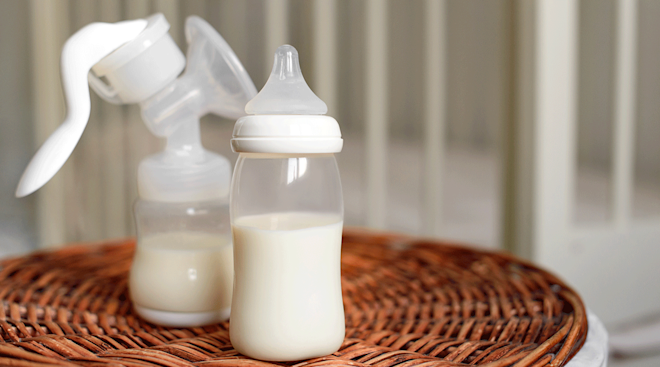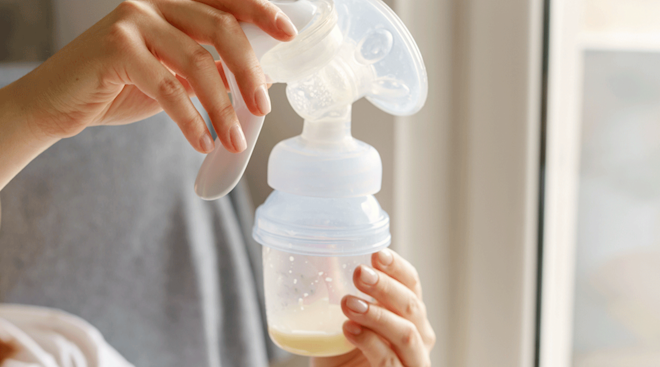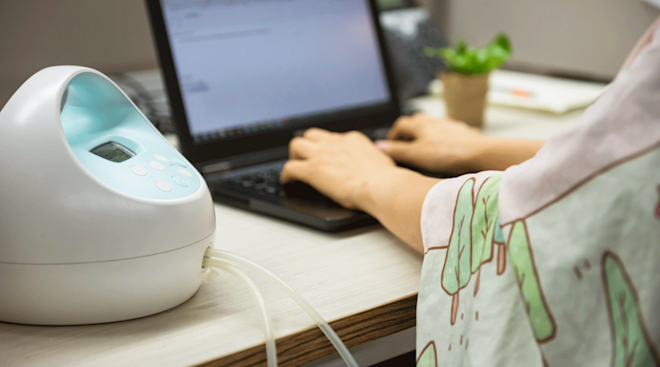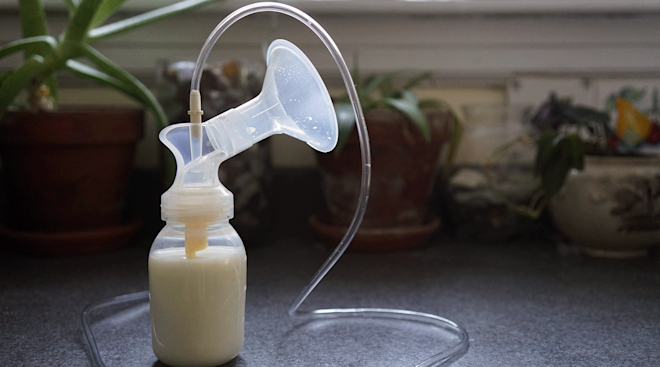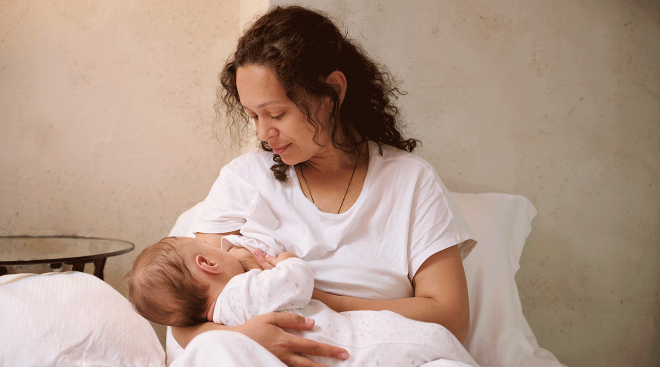Black Women on Finding Joy in Breastfeeding
There are undeniable benefits to breastfeeding. But breastfeeding rates remain lower among Black moms due to unique historic, economic and social challenges. Still, many Black moms persist through the difficulties—and find joy.
“One of my favorite things [about breastfeeding] is, when your baby is sick, or you’re sick, your body makes antibodies for baby,” says Sierra Woods, RN-BSN, IBCLC, CPST, a lactation consultant, postpartum doula and the founder of MelaMama Maternal Wellness, an organization that focuses on providing lactation care to marginalized communities in Indianapolis. “No other milk can do that. … I have a client who that was what pushed her to be like, ‘We’re going to keep doing this.’”
Ahead, Black breastfeeding women share how they find happiness along the journey.
One of the biggest challenges for Black women breastfeeding is a lack of representation, both among Black moms and lactation consultants. Like with so many things that impact Black people, it’s difficult to see yourself doing something when no one who looks like you has shown you how. Other challenges for Black women breastfeeding are a complicated cultural history going back to slavery, economic hurdles—Black women are more likely to be the primary earner, which adds pressure to go back to work—and insufficient access to breastfeeding education.
Despite—and perhaps because of—historic challenges, many Black women find joy, healing and empowerment in breastfeeding, and encourage each other along the way. After all, you can’t be what you don’t see. Here are a few of their stories.
Lauren, 30
As a mom of four with one more on the way, Lauren, who’s based in South Carolina, can confidently confirm that not every breastfeeding experience is the same. “I only went five months the first time,” she recalls. “I didn’t have a great diet, so that contributed to my supply and I also had postpartum depression (PPD).”
With her subsequent pregnancies, Lauren was able to breastfeed longer—10 months with baby No. 2 and 18 months each with babies No. 3 and 4. “I had a really great breastfeeding counselor, and WIC provided me with a manual pump as well as an electric pump,” she says. Lauren didn’t have breastfeeding examples in her family, but she found community through Facebook groups. As she anticipates the arrival of baby No. 5, she hopes other Black parents talk about their breastfeeding experiences to challenge limiting stereotypes. “There are very few Black spaces that speak openly about [breastfeeding] experiences within our community, and that support is much needed,” she says.
Takeisha, 32
When Takeisha, a Milwaukee-based photographer, gave birth to her first child four years ago, she got little breastfeeding support from the hospital staff who oversaw her delivery. But a small nudge from a nurse suggesting she try letting her newborn latch was enough to set Takeisha and her daughter on a journey that lasted 17 months—and with that, she ended a longstanding generational cycle.
Now that she has two daughters, ages 2 and 4, Takeisha reflects on her self-determination to keep going. “I didn’t see anyone breastfeeding in my life, so when I decided to do it, I just winged it,” she says. Although she briefly talked to a lactation consultant, she mostly used the resource she had the most access to—Google. “I would just type in, ‘foods that help produce milk,’ ‘foods not to eat,’ ‘how to pump while you’re at work.’ Google was my best friend,” she says.
Takeisha says she noticed significant benefits, from two babies who never had a single ear infection to the deep connection that has lasted long after her daughters self-weaned. She’s also proud to be able to lead by example. “My best friend now is pregnant and she’s asking me, ‘Keisha, now you know me, am I going to be able to breastfeed or not?’” Her cousin, who formula-fed her first baby, was encouraged to breastfeed her second baby by Takeisha’s example. “It feels good to see people wanting to do it because they saw me have a positive experience,” she says.
Leeza, 34
When Brooklyn-based freelance creative Leeza Joneé envisioned her motherhood experience, she knew breastfeeding would be part of it. “My grandmother had eight children, [and] she raised them in rural North Carolina at a time [when] breastfeeding was the only way,” she explains. “So, to know that this was how my own mother was nourished, I knew—even before I was pregnant—that it was the way I wanted to provide nourishment for my babies and as a way of bonding.” She says her 10-month-old son, whom she intends to breastfeed at least until he turns 2, is nursing on demand and happily thriving.
Breastfeeding has been a source of connection for Joneé, not just to her growing baby, but to her own body. “Through [breastfeeding’s] unique challenges and triumphs, I’ve become more in tune with my body and my child’s body,” she says. “I know he’s comforted from my heartbeat and our gazes.” As she juggles freelance work and family obligations, Joneé recognizes that breastfeeding will always come with challenges. She remembers one time leaving home without her breast pump charger and having to hand-express to avoid becoming engorged. But even as she’s still in the thick of it, she says it’s worth it. “These are things to take into consideration, but not to deter a new mom from exploring the breastfeeding journey,” she says.
Gaby, 34
For Gaby, a kids’ portrait photographer in Decatur, Georgia, breastfeeding was a way to bond with her baby beyond pregnancy. “We spent so much time together, growing together through the 40 weeks, that I knew I wanted to have something to look forward to,” she says. When Gaby’s daughter, now 9, refused to take a bottle from her, Gaby says breastfeeding was the only viable option for her and her co-parent. “To be quite honest, we didn’t have any other choice,” she says. “We breastfed because it was the more affordable alternative.”
Gaby says her choice to breastfeed her daughter for over three-and-a-half years helped her with her mental health. “Where I personally struggled with my pregnancy, breastfeeding my daughter for as long as I did provided me with a bodily release,” she says. “It was a relaxing experience for me. On days where postpartum took a mental toll, the feeding and sleeping schedule we built as a family kept me grounded.” Gaby credits extended breastfeeding for her daughter’s good health and their unique closeness.
You might have been discouraged from breastfeeding, or bombarded with tales of bleeding nipples and babies who don’t latch. But breastfeeding can be a positive experience for Black moms. Here’s some expert advice for Black women breastfeeding.
- Take a breastfeeding class. The education will help you along the way, says Woods. Bring all your questions—even the silly ones.
- Line up a lactation consultant. Include a lactation consultant when planning your birth, says Woods. An organization like Woods’ MelaMama can help you link up with a Black lactation consultant. WIC Breastfeeding Support and La Leche League offer connection to lactation consultants, as well as other free and low-cost resources including classes and breast pumps.
- Identify your support system. This could be your partner or a friend—anyone who is supportive of you breastfeeding. “Write down people that you know will be supportive of you and your decisions, not what they want,” says Woods. It helps to bring that person to your prenatal classes, she adds. “They need to know all those things too, to help remind you for those moments when you’re like, ‘I can’t mentally do this.’” You can also try to link up with support through local social media groups.
- Don’t disconnect from your old life. Woods, herself a mom of two, advises taking a break for self-care whenever you need to. “I’m the type of person that I never disconnect from my friends,” she says. “So if I ever feel overwhelmed … I always make a point to plan some type of girls’ day.”
- If you’re returning to work, know your pumping rights. Read up on the PUMP Act, which helps provide employees with resources to pump breast milk during work.
At the end of the day, don’t shame yourself if you fall short of your personal goal. You’re likely to feel the happiest in your breastfeeding journey when you’re kind to yourself through the hard stuff and do what you can for as long as you can. The breastfeeding experience looks different for everybody—and that’s part of what makes it so beautiful.
Plus, more from The Bump:
Sierra Woods, MS, RN-BSN, IBCLC, CPST, is a registered nurse, lactation consultant, postpartum doula and the founder of MelaMama Maternal Wellness, an organization that focuses on providing lactation care to marginalized communities in Indianapolis. She’s also a certified child passenger safety technician.
BMC Public Health, Race/Ethnicity-Specific Associations Between Breastfeeding Information Source and Breastfeeding Rates Among U.S. Women, March 2023
Academy of Lactation Policy and Practice, Demographic Report of Current CLCs, September 2019
Journal of Southern History, Mothers’ Milk: Slavery, Wet-Nursing, and Black and White Women in the Antebellum South, February 2017
Pew Research Center, In a Growing Share of U.S. Marriages, Husbands and Wives Earn About the Same, April 2023
Navigate forward to interact with the calendar and select a date. Press the question mark key to get the keyboard shortcuts for changing dates.




































